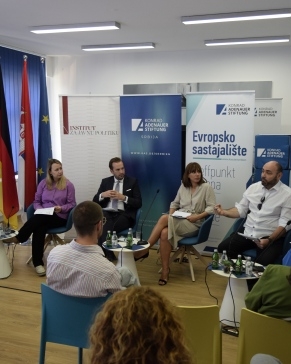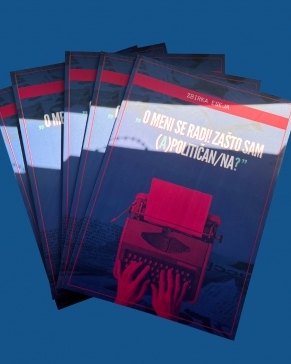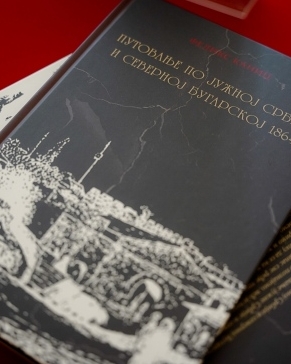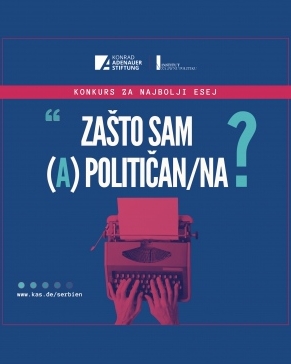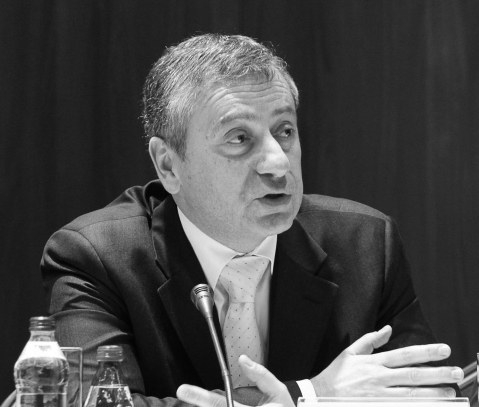
The unsolved murder of prime minister dr Zoran Đinđić warns us that the chasms of the past are still ahead of us. Is the political question of the assassination already anachronistic? Perhaps the tacit agreement of the majority have been reached, both profiteers and those aggrieved, that the truth sometimes disturbs the future, whether it is future in civilization or in a Gulag. Serbia is today split along the dividing lines between Great powers. There is a reckoning of the tragic outcomes of unsuccessful transition. The ghosts of the past, military aggression, isolation, crime and looting, have become specters of Putinian quisling propaganda, conspiracy theories, virtual schizophrenia and societal misery, fear from civilization, from vaccines GMO food, HAARPs and chemtrails. The burden of the present doesn’t tolerate the burden of the past. The memory of the prime minister is now only sign by the road. Although the current prime minister, reminiscing about Đinđić’s legacy, admonishes that we should accelerate on the reform course, all signs in Serbia warn that we should slow down, and we still haven’t decided which way we should go.
If the analogy for the previous era is needed, it is unclear whether the consensus has been reached in the government, in the parliament and in politics of president and prime minister. We are still troubled by a lack of judges, prosecutors, scientists and inovators; while at the same time there is surplus of public spending, regulatory authorities, and corruption and public ruses. The media is again united in everyday propaganda war against reforms, Europe, USA, NATO, free market and free consciousness. Cyclic poisoning of the common sense is a symptom of a deficient culture, which generates the cults of deficit. GNP of our past is modest. Behind us are not only the wasteland of chaotic destiny and wrong choices, but also the events and processes which never happened. The memory of the assassination reminds us about the state of institutions, and not only the state of political will. While we’re confronted with certainty that we wont escape poverty following the imagined five-year-plan, the assumption is imposed again that the institutional development is not only the privilege and competence of the rich, but also of those who see the only alternative to the unfavourable economic conjuncture in the rule of law. In that sense, the examples of East European countries are encouraging, but they have developed the memory of totalitarian past that was imposed by foreign occupiers and domestic collaborators. The tendencies of return towards that past, under the impression of aggression against Ukraine, which is relatively successful, are not present in Serbia by pure chance. Perhaps the occupation of Ukraine was indicated by Đinđić’s assassination? That question is not facing the current prime minister only, but also the whole our culture, and not only political culture.
How will we negotiate with EU, approach NATO, reconcile with our neighbours, capitalize the economically and socially unproductive middle class and face Kosovo, which is obstacle for our minds and the Constitution? Current and future academicians, along with church dignitaries, have already signed petitions demanding that dr Vojislav Koštunica should be exempt from witnessing on trial regarding the Red Berets mutiny. They have also petitioned that Serbia should abandon EU integrations. The author of indictment lawyer Srđa Popović, during his life and even after, was the victim of media hunt, similar to those preceding Đinđić’s assassination. By attacking him personally, and freedom of consciousness in general, it was attempted to supress not only the memory of prime minister Đinđić, but also the ghosts of past and future, tackled by prime minister, along with evil that killed him, and which griefed all of us, regardless of our opinions.
The death of Srđa Popović disturbed the establishment because the question about the role played by Aleksandar Tijanić (who also died at the approximately same time) in media preparation of the prime minister’s assassination could again be asked. The same thing happened to Ivo Andrić, who also had died in inopportune moment, overshadowing the death of Veljko Vlahović, which was of great importance for regime and the state of consciousness. I don’t claim that by taking the right to live freely means taking the right to die, the right to remember, the processes which are not only biological, but are content of civilization as well. I don’t claim that the past repeats itself. But the memory is sometimes the only meaning of the future.

